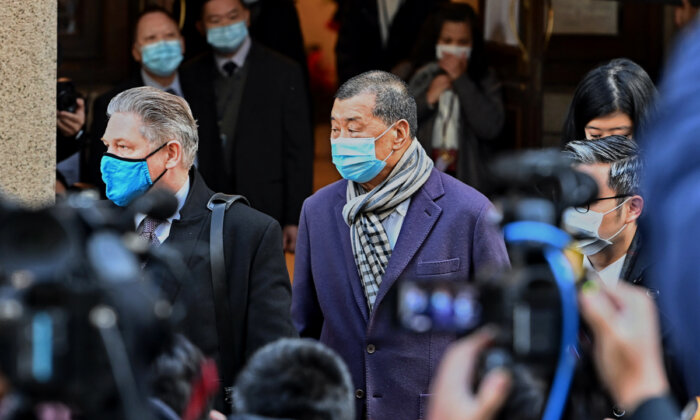Jimmy Lai was among the highest-profile arrestees under a 2020 update to the Hong Kong National Security Law backed by the Chinese Communist Party.
Hong Kong businessman and pro-democracy activist Jimmy Lai testified in court on Nov. 20, for the first time since he was detained in 2020.
He took the stand on Nov. 20, continued testimony the following day, and denied allegations that he incited hatred or pressed foreign officials to change their stance on Hong Kong.
Lai, 77, told prosecutors on Nov. 20 that he did not ask U.S. Secretary of State Mike Pompeo and U.S. Vice President Mike Pence to take action against the Chinese regime during Hong Kong pro-democracy protests. On Nov. 21, he testified that he did not try to incite hatred against the Chinese regime.
“We were always in support of movements for freedom,” Lai said on Nov. 20, adding that he had not backed independence movements.
“I just convinced them to come out and demonstrate,” he said on Nov. 21.
“There’s no hate here, no hatred here.”
Lai, owner of the Hong Kong newspaper Apple Daily, has been a prominent supporter of the Hong Kong pro-democracy movement and a critic of the Chinese Communist Party (CCP).
He was among the highest-profile arrestees under a 2020 update to the Hong Kong National Security Law backed by the CCP, which criminalized types of political assembly in broad terms, such as international organizations working to “realize political goals.”
A national security companion law was passed earlier this year to facilitate the implementation of the national security law, giving offenses such as treason, insurrection, and sabotage a maximum penalty of life in prison. These laws have been condemned by the international community as draconian and anti-freedom, especially because they are applied to foreign citizens as well.
UK Prime Minister Keir Starmer, parliamentarians, and U.N. representatives have called on China to release Lai, a British citizen. Earlier this month, the U.N. Working Group on Arbitrary Detention found that Lai was unlawfully and arbitrarily detained, and Amnesty International has recognized him as a prisoner of conscience.
After his arrest in 2020, Lai was briefly released on bail before having his bail revoked at the end of the same year. He was charged with two counts of conspiracy to collude with foreign forces and conspiracy to publish seditious materials. He pleaded not guilty.
His trial began last year but was adjourned for months, during which Lai was held in solitary detention.
International human rights organizations have expressed concern over Lai’s physical and mental well-being, noting that he has diabetes and does not have access to independent medical care, and as a practicing Catholic, also has been denied Holy Communion for almost a year.
Prosecutors showed text messages that Lai sent to a group chat, sharing a 2020 executive order by U.S. President Donald Trump to revoke special privileges for Hong Kong after the passing of the updated national security law, which was seen as bringing an end to Hong Kong’s autonomy from the CCP.
Lai testified that he did send the message, but denied asking an associate to compile a list of people whom they believed the United States should sanction. He said he always supported peaceful protests, was against using violence, and went into the media business to express his belief in the rule of law and desire for freedom.
“The more information you have, the more you are in the know, the more you are free,” he said.
The United States has also condemned Lai’s prosecution and imprisonment, and Trump said in an interview while campaigning that he would secure Lai’s release.
In an interview with Trump published in late October, radio host Hugh Hewitt mentioned Lai, telling Catholics in America and around the world that he was an important prisoner of conscience. He asked Trump if he would speak with CCP leader Xi Jinping about Lai.
“One hundred percent, I’ll get him out,” Trump said.
Lai’s testimony began a day after Hong Kong sentenced 45 pro-democracy activists to up to 10 years under the same national security law. The United States has said it is preparing new sanctions against Hong Kong officials in response.
Reuters contributed to this report.

